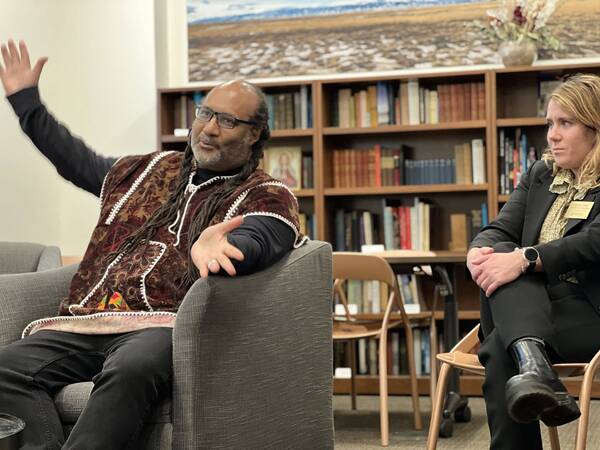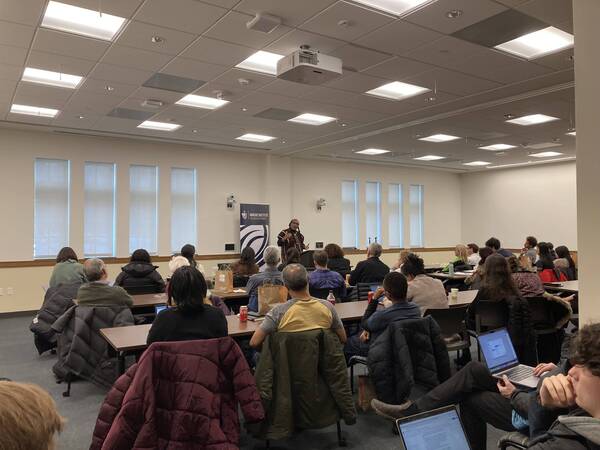Lewis Gordon, is professor and department head of philosophy at the University of Connecticut, a political thinker, educator, and musician. His books include Freedom, Justice, and Decolonization (Routledge, 2021) and Fear of Black Consciousness (Macmillan, 2022). Gordon is the 2022 recipient of the Eminent Scholar Award from the Global Development Studies division of the International Studies Association. He delivered the first of a series of lectures on “Decolonizing Scholarship.” Hosted by the Nanovic Institute for European Studies, this series will run through the spring ‘23 and fall ‘23 semesters and will feature scholars from various academic disciplines at the top of their fields.
Shasta Kaul, a third-year Ph.D. student in the Department of Political Science at the University of Notre Dame, has written a summary of Gordon’s lecture, which may also be re-watched on the Nanovic Institute’s YouTube page.
On February 3, 2023 Lewis R. Gordon, professor and department head of philosophy at the University of Connecticut, delivered the lecture “Decolonizing Philosophy, Decolonizing Theory.” It opened with a multilingual string of greetings culminating in the Zulu “sawubona”: I see you. “Sometimes,” Gordon said, “it’s just wonderful to be seen.”
The recognition of others for the sake of clarity in communication was crucial to the way that Gordon spoke of decolonization in the lecture. He characterized it as the adoption of a teleologically suspended pursuit of shared truth, arguing that such suspension allows one to create genuine connections with people and things other than themselves, and with times, past and future, other than their own. Gordon asked the audience to consider the importance of ancestors and descendants placing particular emphasis on the implications of becoming an ancestor. He explained that these cannot be merely biological. We shape the way that our descendants come to understand, accept, and challenge their ways of knowing what they know. It is impossible to operate under the assumption that we have no obligations to them. In other words, our actions have a much longer lifespan than we do. They do not die with us; they continue to shape truth for a long time.
Epistemological capital

In keeping with the theme of effective communication, Gordon told some captivating stories to further its case. One such story, from Gordon’s recent book Fear of Black Consciousness, concerned a young Jamaican schoolboy’s interaction with an Anglican minister charged with the responsibility of upholding educational standards at the boy’s school.
When the minister asked the boy who knocked down the walls of Jericho, the student answered, “not me!” So the infuriated minister complained about this serious lapse in learning to the boy’s teacher who responded, “I’ve known this boy for a long time. If he says he didn’t do it, he didn’t do it!”
After giving the audience a moment to enjoy the absurdity of these interactions, Gordon pointed out that an essential aspect of the comedy of the moment was that the little boy had no “epistemological capital” – no “expertise” or his own respected account of reality. He explained that more often than not, there are stipulated ways that one is expected to ask and answer questions. Deviations from these expectations cause the deviator to appear ignorant or unthinking. Gordon spoke in favour of questioning and dismantling default epistemological capital — including that of a philosophy professor: “when you tell people that you’re a philosopher, they think that you’re smart.” A standard or a certificate gets in the way of conversation.
Unfortunately, Gordon said, such standards and certificates are the foundations of our education system. So, he holds that it is the role of academics to clear up miscommunication, to “translate,” in some sense, for the benefit of the little boy and the Anglican minister what the other is saying. Academics must seek to reveal – not conceal or obfuscate – the truth.
Philosophers must cease to be “philosophy nationalists” and overcome what Gordon refers to as “disciplinary decadence” (a concept he explores in his earlier work Disicplinary Decadence: Living Thought in Trying Times, Routledge, 2006) and engage with ideas from other disciplines. “We must not fetishize our methods,” he explained. Ontologizing the methodology of a discipline attributes to that field a special Godly authority over what is real. Such a view of reality wrongly conceives of it as a thing independent of people.
“The solution,” he asserted, “is not interdisciplinarity, but transdisciplinarity.” The former approach does not work all that well because when disciplines view themselves as independent wholes, they end up interacting like two ships passing in the night. However, when disciplines actively blur boundaries, their interaction begins to be comprised of communication proper. Philosophers begin to “go outside” of philosophy to find reality and acknowledge that it is not a thing, but a relationship.
Making evidence evidential
Without warning, midway through the lecture, Gordon struck the podium with quick but loud blows. He told a startled audience that he had just tapped it 7 times. Then, he did it again, and it was less startling; it almost had a decipherable cadence. He went on to frame and demonstrate the tapping in different ways: in groups of 4s and 3s, 5s and 2s, 6s and 1s. Aside from the fact that Gordon is a good percussionist, the exercise conveyed that it is the contextualization of evidence that makes it evidential. The interludes between tapping primed the audience to listen for a shared rhythm.
The lecture turned to a discussion of the allegory of the cave from Plato’s Republic (in which Plato describes a group of people who live chained to the wall of a cave, facing a blank wall. They watch shadows projected on the wall from objects passing in front of a fire behind them and give names to these shadows. The shadows are their reality, and the implication is that their reality is not an accurate representation of the world. They represent the fragment of reality that we can normally perceive through our senses. The objects under the sun outside the cave represent the true forms of objects.) Gordon underscored the importance of remaining committed to not only leaving the cave but also to “unshackling others”. There is great value to seeking out that which we can all see and recognize relationally as truth. He equated making evidence evidential — making previously sidelined experiences and ideas make sense for others — to helping each other to see beyond the shadows.
Seeing the light can also simply consist of bringing that which is already before us into the light. Gordon elucidated this by asserting that not every aspect of “euro-modern colonialization” has been intentional. A myriad of motivations for colonizing clad themselves in plain untruths that would have fallen apart if they had been collectively examined, but when colonizers were coming up with justifications for conquest, they were neither talking amongst themselves nor with the colonized. Over time, such justifications (for instance, the belief that those with darker skin are inherently inferior) became reified.
If Eurocentric justifications had been investigated and misgivings communicated, they could have been discarded earlier. Without investigation, they became the background against which much of the world has operated.
Bad Faith

Gordon believes that euro-modern colonization has taken place in a theonaturalistic context, one in which the background becomes conflated with that which is natural: “one looks at nature as infused with the action of God because in a world where God is real, that which is real emanates from God.” Simply because false justifications are shrouded in the dark — that is, because they are unexamined — they end up being erroneously theologically validated. Gordon spoke of such validation as “bad faith.”
The effect of bad faith is the colonization of the mind. This causes not only those who oppress but also those who are oppressed to believe the justifications for oppression. Gordon compared this ingenious mechanism with parents failing to properly grapple with implications of the problem of evil (“If God is good and omnipotent, why does evil still exist?”) when posed by their children by getting the children to forfeit. Examples of less-than-satisfactory means to do this include: blaming the child for being one of many humans who have used their God-given free will incorrectly, and refusing to acknowledge evil as evil because it is part of a bigger (good) plan. “Winning an argument,” Gordon said pointedly, “is not the same as being right.”
Without speaking explicitly to the validity of these responses to the problem of evil, Gordon highlighted the impotence of claims that do not make any attempt to move the status quo away from that which we may all recognize as evil. Human beings, as a result, lose their agency to forces and contexts that are supposedly natural. Gordon explained that the colonization of the mind is far more effective than any brute oppression will ever be.
Where did we begin?
Given that people change as a result of changing minds, that ideas, communication, and relationships we have with one another constitute reality, Gordon deems familiarity with intellectual history to be of utmost importance.
He said that he finds the idea that philosophy began in Greece inconceivably absurd and asked what human beings could possible have been up to before that. Presumably, he exclaimed, it was a lot of “this.” Gordon demonstrated the “this” in question by standing in complete silence for a few seconds, making the obvious point that surely that couldn’t have been all that we did.
The Sumerians, Bablylonians, and the Egyptians were philosophizing long before the Greeks. The point Gordon was making was not that that which is earlier is better, but that we believe that Greece was the beginning, that ideas began in the East but matured in the West. We are convinced that other comparable ideas could not have existed, that Europe could not have existed any differently than it does now. We believe that the ideas we take for granted in the West originated in places of diversity and that since this diverse moment of origination (which produced fixed, pure, and unimpeachable truths) only declined has ensued. The lecture urged us to reconsider everything, including the concept of Europe itself.
Where do we go from here?
Gordon spoke passionately against the commodification of knowledge: the idea that knowledge can only be valuable if it is marketable renders truth and reality irrelevant. A knowledge market does not care to reconsider that which is taken for granted, to examine that which has been left shrouded in darkness or in the minds of those whose experiences have hitherto been unimportant. It does not care to produce meaning together, in a communal fashion.
The lecture advanced a move from a “malignant” and “narcissistic” colonial love that says “I love you because you are like me” and which seeks to make the subject of the love identical to the source of love, to a “radical” love which wants freedom for its subject. This freedom can enable the subject to contribute to the creation of meaning.
Gordon closed by reminding us that truth does not exist “out there,” that the pursuit of reality does not have to be preoccupied by substance metaphysics, and that the idea of the non-relational human being is completely incomprehensible. Nobody can reasonably claim reality for their own singular use.
About the author

Shasta Kaul is a third-year Ph.D. student in the Department of Political Science at the University of Notre Dame. Her research uses the works of Machiavelli and Kautilya to explore how political realism can challenge and reframe existing approaches to value pluralism in modern democratic societies.